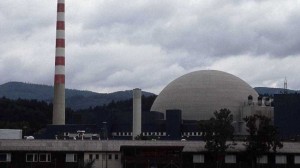 A view of Iran�s Bushehr Nuclear Power Plant[/caption]
A view of Iran�s Bushehr Nuclear Power Plant[/caption](Reuters) -�Iran�will face pressure on Tuesday to propose scaling back its nuclear program to win relief from crippling sanctions as talks between world powers and Tehran resume after a six-month hiatus.
A two-day meeting in Geneva between�Iran�and the United States,�Russia,China,�France, Britain and�Germany�is widely seen as the best chance in years to end deadlock in a decade-old dispute over Iran's nuclear program that could otherwise trigger a new Middle-East war.
The election in June of a relative moderate, Hassan Rouhani, as Iran's new president, and his pledges to smooth Tehran's international relations, has raised hopes of a negotiated solution.
On the eve of the Geneva talks, the United States held out the prospect of quick sanctions relief if Tehran moves swiftly to allay concerns about its nuclear program, although both countries said any deal would be complex and take time.
Western diplomats said it remained unclear whether proposals for ending the dispute�Iran�has promised to put forward in the meeting would be sufficient to enable headway to be made.
The United States and its allies suspect Iran is seeking to develop the capability to make nuclear weapons. Iran denies this but its refusal to curb sensitive nuclear activity has drawn tough international sanctions.
"We definitely hope that the new momentum will translate into some concrete step forward," a senior Western diplomat said ahead of the talks.
A senior U.S. administration official said: "I expect that they will give us a detailed understanding of what they have in mind. How detailed, I don't know."
Iranian Foreign Minister Mohammad Javad Zarif had dinner with European Union foreign policy chief Catherine Ashton, who represents the so-called "P5+1" nations in the talks, on Monday evening in Geneva.
A diplomat from one of the six powers said Zarif did not disclose details of any Iranian proposal.
"We had a good dinner," Zarif told Reuters as he returned to his hotel after the two-hour dinner at the Iranian diplomatic residence in Geneva. When asked if he had given Ashton details of an Iranian proposal, he said: "Proposal is for tomorrow."
CONSIDERING RAPID CHANGES
The U.S. administration official said that any potential sanctions relief would be "targeted, proportional to what Iran puts on the table".
"No one should expect a breakthrough overnight," the official stressed, speaking on condition of anonymity.
In a hint that Western powers are seriously considering easing sanctions in response to any Iranian concessions, leading U.S. and EU sanctions experts came to Geneva to offer help in discussing any potential changes. Diplomats said scenarios for potential relief had been drawn up ahead of the talks.
Since 2006, Iran has rejected U.N. Security Council demands that it halt uranium enrichment and has continued to expand its nuclear fuel program, leading to increasingly harsh sanctions.
Hopes of a negotiated settlement of the dispute were raised last month when President�Barack Obama�and Rouhani spoke by telephone, the highest level U.S.-Iranian contact since Iran's Islamic revolution in 1979. Washington and Tehran have not had diplomatic relations since 1980.
Rouhani said in New York last month he wanted a deal with the P5+1 within three to six months. Zarif played down expectations that an agreement would be reached this week.
"Tomorrow is the start of a difficult and relatively time-consuming way forward," he said on hisFacebook�page on Sunday.
The U.S. official said the Obama administration was encouraged that Rouhani, who avoids the strident anti-Western and anti-Israeli rhetoric of his predecessor Mahmoud Ahmadinejad, had a mandate to "pursue a more moderate course".
In the past, the six powers have demanded, among other things, that Iran halt uranium enrichment, particularly to 20 percent fissile purity, move stockpiles of enriched uranium out of the country and close down the Fordow enrichment plant, which is buried inside a mountain south of Tehran.
Iran has rejected the demand that it send enriched uranium abroad but signaled flexibility on other items.
Israel, widely assumed to be the Middle East's only nuclear power, has warned the West not to ease sanctions before Tehran has addressed fears about its ambitions.
By�Reuters
The Iran Project is not responsible for the content of quoted articles.










